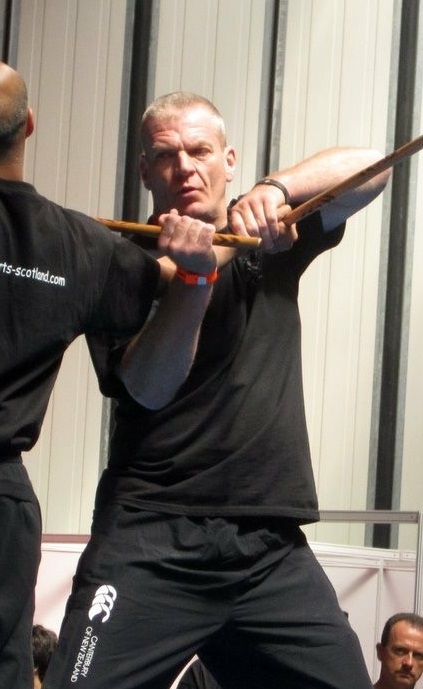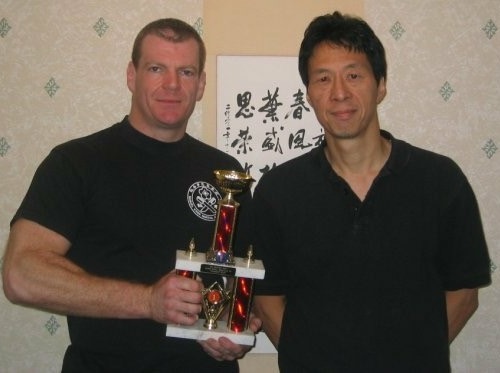What is MND
Find support
I have MND
I am supporting someone
Get involved
Research
About MND Scotland

Now Paul has decided to speak out, in retrospect, to help highlight the challenges that people with rapidly debilitating terminal illnesses, like MND, face when trying to access social housing and social care in the city.
A former Physical Training Instructor in the Royal Artillery, Paul’s diagnosis with MND saw him decline from fighting-fit to house-bound in just a matter of months.

Today Paul has extremely limited mobility, impaired speech and uses a ventilator to help him breathe.
Until as recently Sunday (29th April 2018) Paul and his partner, Vikki Williams (47), lived in their small private-rental flat on the city’s Canaan Lane. The couple, struggling to cope on Vikki’s salary alone, began imploring Edinburgh City Council in April 2017 to recognise the seriousness of Paul’s MND diagnosis and prioritise the pair for accessible housing.
But Paul became trapped when Edinburgh City Council refused to place the couple on the highest priority.
Paul said: “I became a prisoner in my flat because I couldn’t go up and down the stairs. Living with MND is your worst nightmare; it’s like wearing a lead suit. Your brain knows what you want to do, but you can’t move to do it. You can have an itch and you just can’t scratch it. Sometimes I’ll get something in my eye and it stings, but I just have to suffer it until it passes. If I need to go to the toilet, I have to try and hold it in until Vikki is home because I’m not able to pull my clothes down and back up. I can’t feed myself either; it’s the most horrendous thing a human can have.”
Originally the couple were told that their situation did not warrant an assessment for top-level housing priority, due to the fact that Paul still had the use of his legs. Vikki attempted to explain the rapidly progressing nature of MND and the fact that time would not be on their side, with no avail.
Over the course of Paul’s progression with MND, Paul and Vikki had bid for a total of 23 flats within a manageable distance of their existing support network. Out of desperation, the couple had even bid for flats that were not fully accessible, but which would represent a marginal improvement for Paul.
Vikki said: “We started applying for flats in April 2017, and after three months of Paul’s health rapidly deteriorating, we got in touch with the Council again to ask how high we were on the list.
“Maybe I was a bit naive; I didn’t know how bad the housing situation was. I got an email back from the Council pretty much saying, three months is nothing, you’re not even anywhere near the top.
“I explained our situation and why we were applying but that didn’t seem to help. I contacted them again and they informed us that, until Paul can’t walk, we wouldn’t be on the top priority list. So they expected us to wait until Paul was physically trapped in our flat before they would consider putting us on the most urgent waiting list.”
“We had our Occupational Therapist come around and do an assessment and we contacted the Council again in August 2017 saying that we’re really desperate now, that we couldn’t get up and down the stairs; still nothing.
“At this point, Paul had next to no strength, his balance was off and he needed to be helped when walking. Taking Paul anywhere near the winding, worn-out, concrete stairwell in our flat would have put us both at a serious risk of injury.

At breaking-point, the couple found out they were finally successful in a bid for a ground-floor flat in late March 2018, but their problems didn’t end there.
Vikki said: “Now that we finally found a flat, we were faced with a new problem – that Paul might lose his care package as we were moving into an area with a different provider. This was the last thing that we needed to hear.”
MND Scotland’s advocacy team stepped in to help Paul and Vikki secure the care package they needed in order to make the move.
The charity’s new Advocacy Service was launched in April 2018 to take the stress away from people affected by MND when they’re trying to get access to the services they need.
Vikki said: “Over the course of the year we were waiting for a new flat, it was never mentioned to us that we would have to consider finding new care. The Council told us that, because we were moving, we might struggle to find care in that area, and they asked us what our ‘Plan B’ was. Maybe I was a bit naïve, but I didn’t realise the whole process would be such a nightmare.”
MND Scotland’s advocacy team quickly tied-in with Paul’s Social Worker and Edinburgh City Council’s Care Matching Unit to issue a care request to local care providers. After explaining the urgency of Paul’s case, including information on free ventilation training and professional grants that MND Scotland offer, the care package was finally secured.
This meant that Paul and Vikki were now able to move into their new ground-floor flat, over a year after beginning their search for a suitable home.
Craig Stockton, CEO of MND Scotland, said: “I would like to thank Paul and Vikki for sharing their story to help raise awareness of Motor Neurone Disease and the challenges that people with MND can face while trying to get access to the services they need.
“MND is a rapidly progressing terminal illness and therefore we believe that people with MND should be an absolute priority when trying to get access to appropriate housing.
“As a charity, we welcome any opportunities to engage with all local authorities, to ensure local housing policies work for people with this devastating disease.”
If you have a story to share, please get in touch with Niamh Callan and Craig Watson in our Communications team at communications@mndscotland.org.uk
Sign up
for newsletter
Get the latest news and events straight to your inbox.
You can help create a world without MND